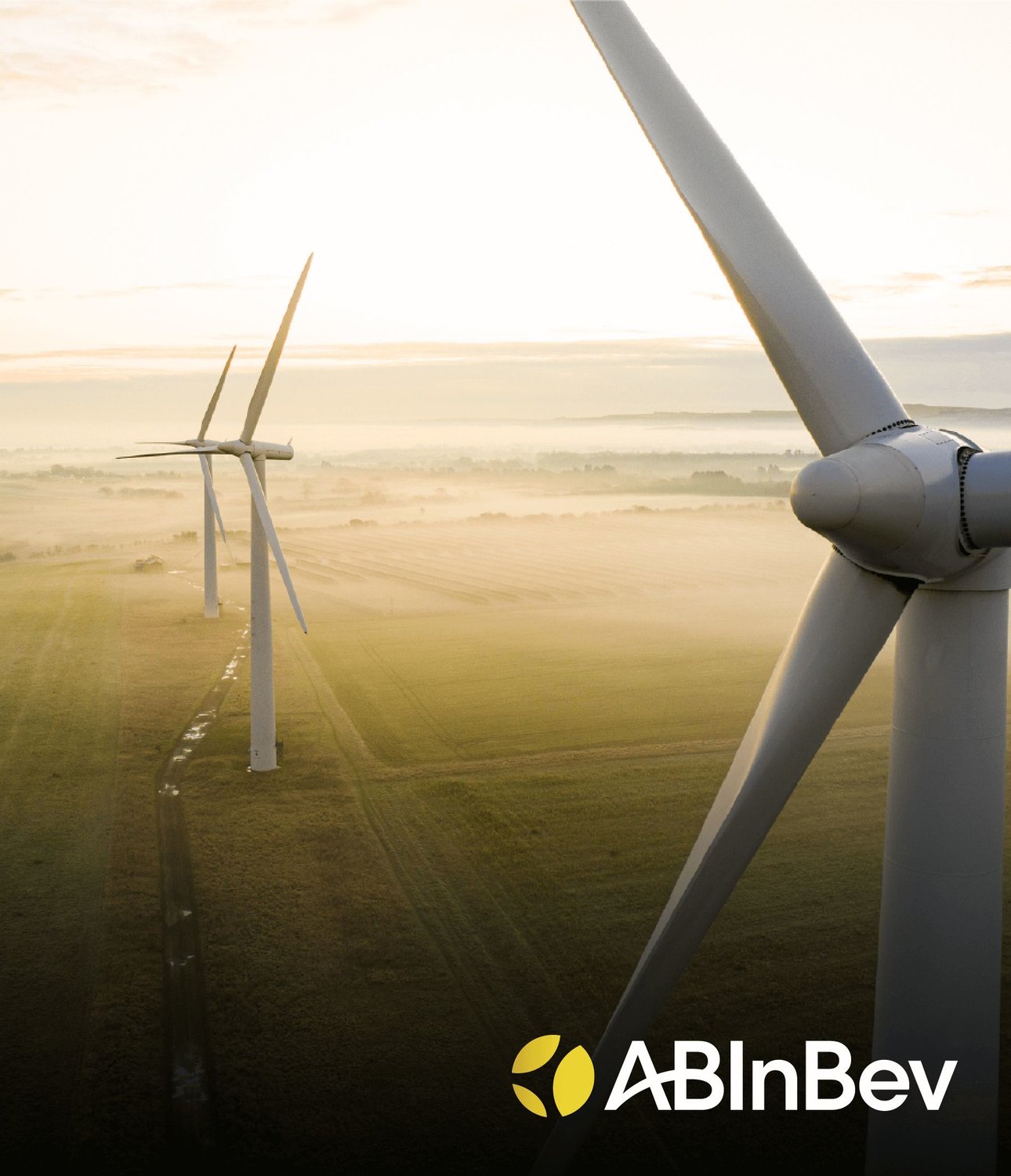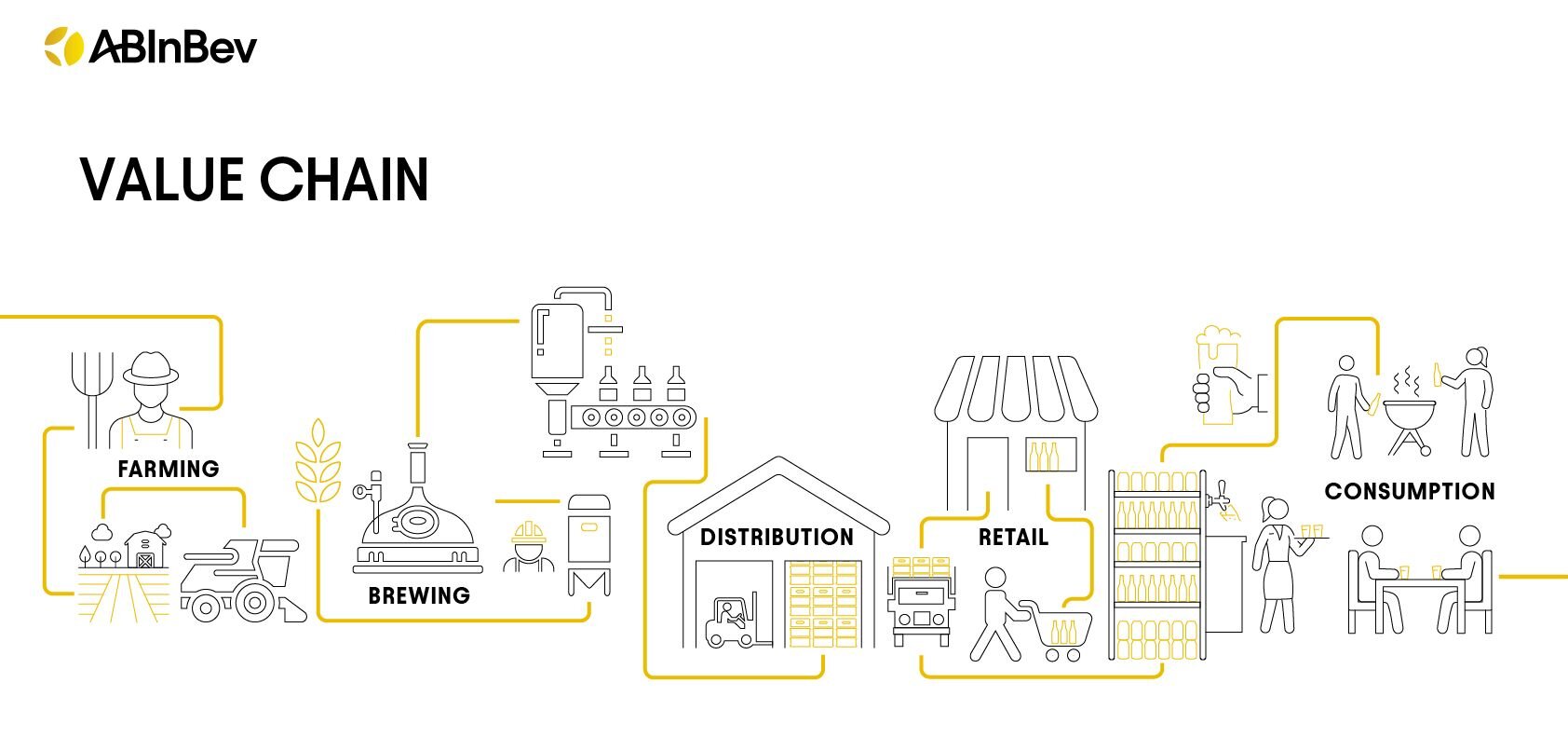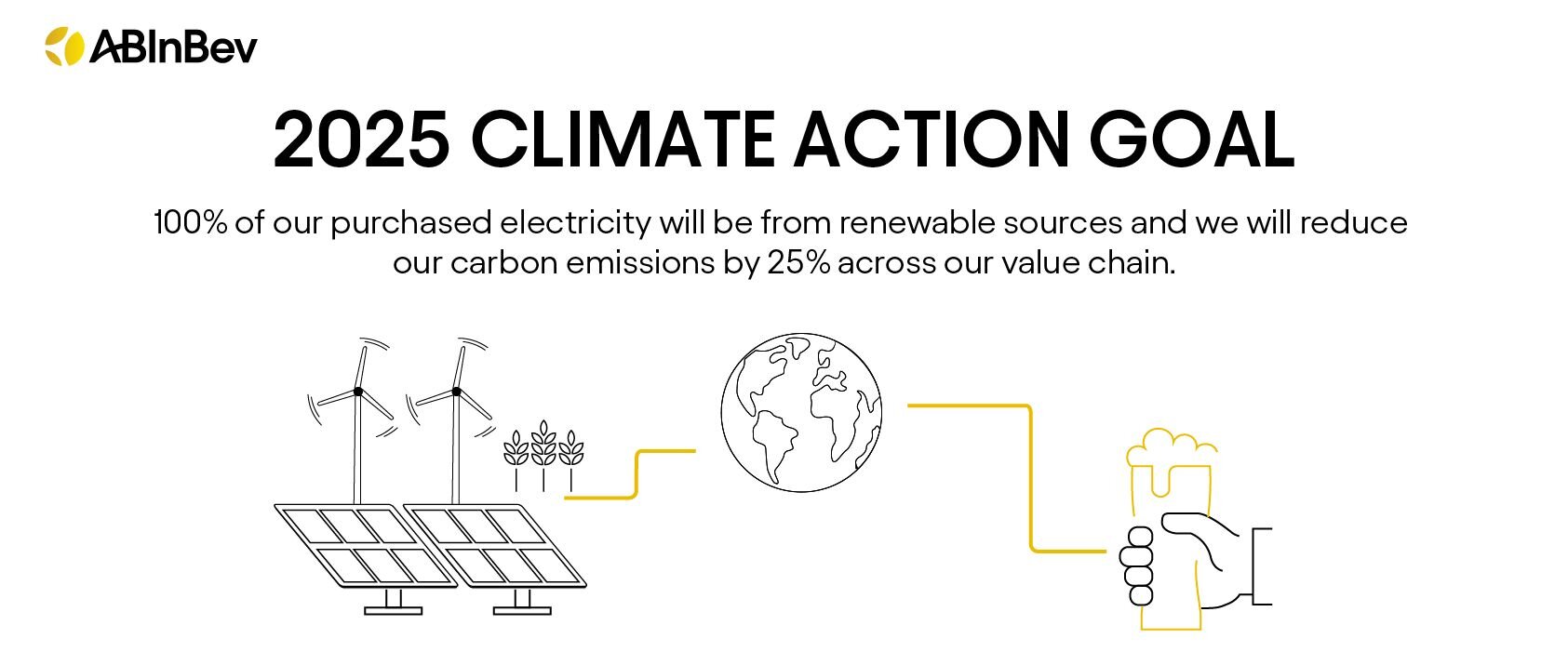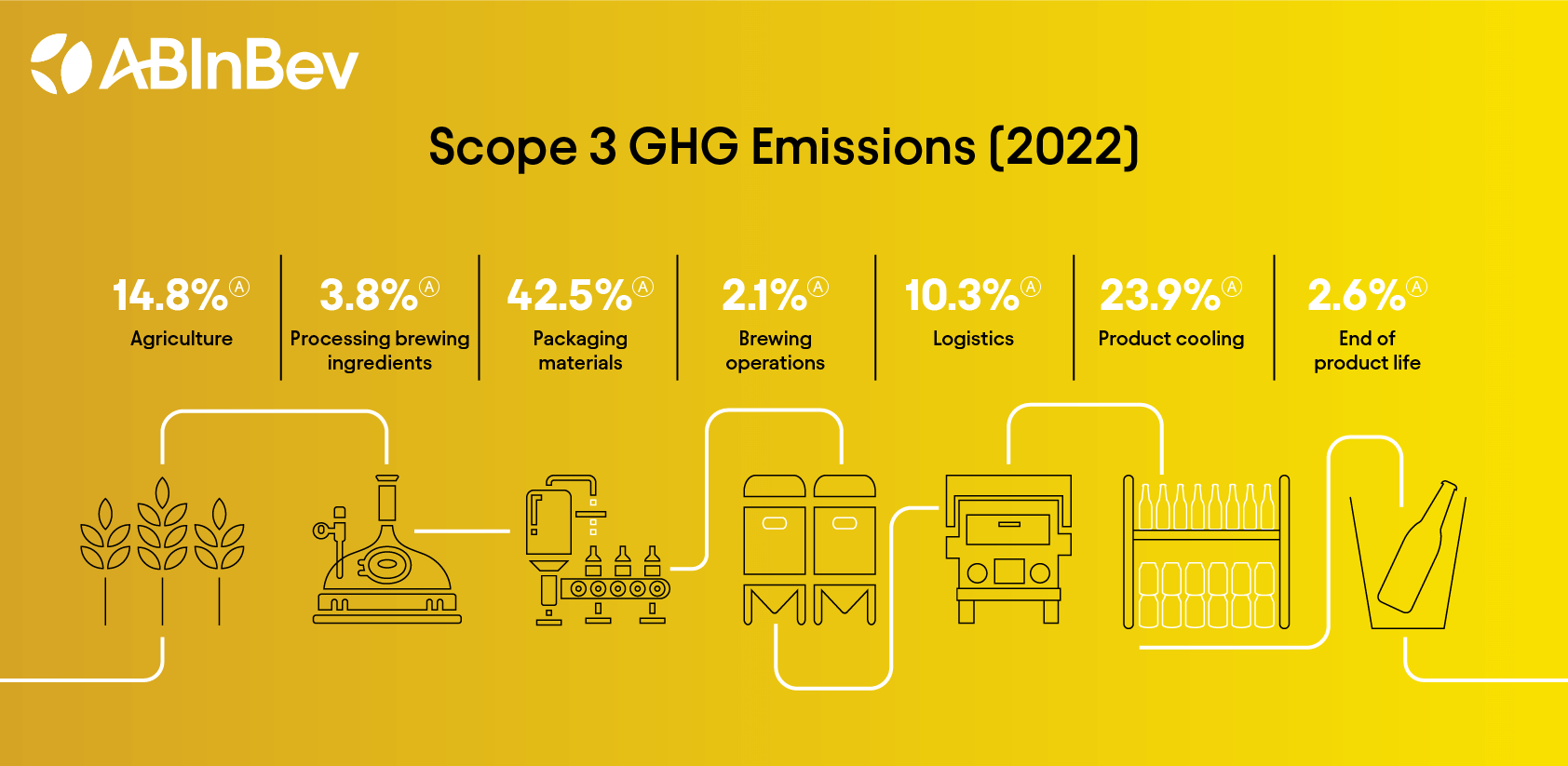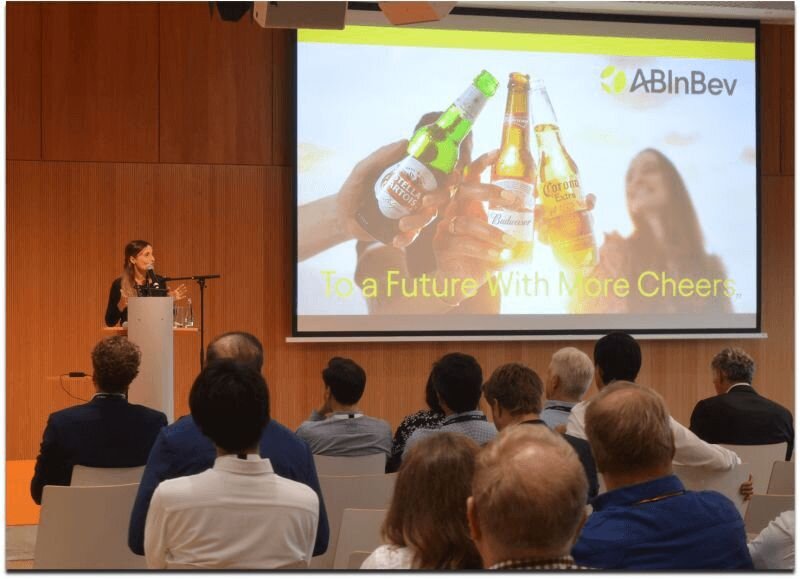Climate change is one of the most pressing global challenges. As the world’s leading brewer, our business is closely tied to the natural environment: agricultural crops and water are our key ingredients, we require raw materials for our packaging, and we need energy and fuel to brew, transport and cool our beers.
All of these have the potential to be impacted by climate change, and we are already experiencing both environmental and social climate-related impacts in our value chain and communities.
The AB InBev value chain starts with our farmers and spans from our brewing operations and distribution network to our retailers and the consumers who enjoy our products.
No one company can solve today’s sustainability challenges alone and we believe collaboration is key to decarbonizing our value chain. To achieve our 2025 climate action goals and our ambition to reach net zero across our value chain by 2040, we work with partners across the wider industry.
Representing 86.7% of our emissions in 2022, Scope 3 is where we see the greatest opportunities for emissions reductions. As reported in our 2022 Environmental, Social and Governance (ESG) Report , we made notable progress last year, achieving a 20.7% reduction in greenhouse gas (GHG) emissions intensity in Scopes 1, 2 and 3 (across our own operations and value chain) versus our 2017 baseline. Our absolute emissions in Scopes 1 and 2 decreased in 2022 by 39.2% versus a 2017 baseline, a reduction of 2.37 million metric tons CO2e.
Our 100+ Accelerator program gives startups an opportunity to pilot their innovation to help solve challenges in global corporate value chains and scale their solutions faster. Since 2018, the 100+ Accelerator has worked with 116 startups from 33 countries to drive transformation across our value chain.
We are also working in our agricultural supply chains to address and mitigate the impacts of climate change for more resilient communities. By using a collaborative systems approach and partnering with organizations like The Nature Conservancy, we’re continuing to help improve soil health and farmer productivity, while also protecting and restoring water resources and biodiversity.
We are proud to have been named this year as a top Supplier Engagement Leader by the international non-profit CDP. Listed in the top 8% of assessed companies, the ranking recognizes efforts to measure and reduce climate risk within companies’ supply chains.
A few recent collaborations helping to reduce Scope 3 emissions in our value chain include:
- Agriculture – We work with our farmers to help scale regenerative agriculture practices that can enrich soil health while improving the ability to capture carbon. For example, our agronomy team in Mexico has developed a program to promote the use of a native cactus species as a functional field buffer that can reduce soil loss and the sedimentation of nearby water bodies and provide farmers with opportunities for additional income. In the first year of this program, 16 farmers in Mexico’s arid plateau planted more than 6,500 maguey agave plants to help keep soil in the fields and support productive agriculture.
- Packaging materials - Together with Ball Corporation, Rio Tinto and Novelis we piloted Canada’s first low-carbon beverage can for Corona beer. The can uses low carbon primary aluminum produced with inert anode technology and carbon-free hydropower, as well as recycled ingot, to reduce aluminum can sheet carbon emissions by more than 30%. In Brazil, we also introduced 100% recycled PET bottles for Guaraná Antarctica -- our biggest soft drink brand in the country -- which are recyclable, can help reduce greenhouse gas emissions and produce less waste.
- Logistics - Following a successful pilot in Leuven and Brussels, we leased 10 additional e-trucks for our Belgian fleet in 2022. The pilot project established the many advantages of electric city delivery: no emissions, less noise and pleasant driving. We estimate that these 10 additional e-trucks will collectively reduce GHG emissions by approximately 150 tons of CO2e annually.
- Product cooling - Ambev, our local brewer in Brazil, partnered with local low-emission energy providers Lemon Energy and Plin, to help convert more than 4,000 bars and restaurants to renewable electricity.
Facilitating climate action with Eclipse
We continue to engage suppliers through Eclipse, our collaboration platform that supports supply chain partners by providing the tools needed to measure and track decarbonization across our supplier value chains while also building capabilities and sharing best practices.
Last year the Eclipse Climate Collective brought together 200 people from across our global supply chain to hear decarbonization best practices from suppliers such as Yakima Chief Hops, Valgroup, Ardagh Group, WestRock Company, Stora Enso, Ecolab and Cooperativa Agrária Agroindustrial.
Eclipse’s success stories are growing. For example, in 2022, a key packaging partner finalized its Scope 3 mapping, applied for a science-based target and signed a joint power purchase agreement with some of its partners.
“The imperative for companies to act on climate change is clear,” said David Hauxwell, Chief Procurement Officer at AB InBev. “We go further together than alone, and with Eclipse we can deepen innovative collaboration towards net zero emissions and demonstrate the beer sector’s leadership on this critical issue. We look forward to engaging with even more suppliers and partners to deliver long-term value and shared prosperity for the future.”
For more on our approach to climate action, see AB InBev’s 2022 ESG Report.

